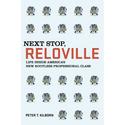Last summer, Sharon Owens had a problem. The Burlington, VT mother of three was trying to satisfy the wishes of her soon-to-be 14-year old daughter who wanted to celebrate her birthday with a canoe outing with friends. The problem was that renting the necessary canoes would have cost hundreds of dollars. Interestingly, it seemed that nearly ever other house in Sharon’s neighborhood had a canoe in the backyard, or parked under a tarp next to a garage. But Sharon, like many of us, did not know her neighbors, and felt uncomfortable asking them. read more »
Suburbs
The New Industrial City
Most American urban economic development and revitalization initiatives seek to position communities to attract high wage jobs in the knowledge economy. This usually involves programs to attract and retain the college educated, and efforts to lure corporate headquarters or target industries such as life sciences, high tech, or cutting edge green industries. Almost everything, whether it be recreational trails, public art programs, stadiums and convention centers, or corporate incentives, is justified by reference to this goal, often with phrases like “stopping brain drain” and “luring the creative class”.
The future vision underpinning this is a decidedly post-industrial one. This city of tomorrow is made up of people living upscale in town condos, riding a light rail line to work at a smartly designed modern office, and spending enormous sums – with the requisite sales tax benefits – entertaining themselves in cafes, restaurants, swanky shops, or artistic events. read more »
Immigrants Are ‘Greening’ our Cities, How About Giving them a Break?
Debate about immigration and the more than 38 million foreign born residents who have arrived since 1980 has become something of a national pastime. Although the positive impact of this population on the economy has been questioned in many quarters, self-employment and new labor growth statistics illustrate the increasingly important role immigrants play in our national economy. read more »
- Login to post comments
Reducing Vehicle Miles Traveled Produces Meager Greenhouse Gas Emission Reduction Returns
Senators Jay Rockefeller (D-West Virginia) and Frank Lautenberg (D-New Jersey) have introduced legislation that would require annual per capita reductions in driving each year. Another bill, the National Transportation Objectives Act, introduced by Representative Rush Holt (D-Indiana), Representative Russ Carnahan (D-Missouri) and Representative Jay Inslee (D-Washington.) would require a 16 percent reduction in driving in 20 years. read more »
People, Planet, Prefurbia
The term “sustainable” relates to a concept called the "Triple Bottom Line” (TBL): People, Planet, and Profit (the three P’s), endorsed by the United Nations in 2007 for urban and community accounting.
American suburban land planning is about the SBL (Single Bottom Line): Profit. In city after city, mindless cookie cutter subdivisions, with characterless architecture, serve cars more than people. This dysfunction is caused by the boiler-plate regulations; engineers adhere to the minimum dimensions mandated by city ordinances to gain density, which maximizes developer’s profits. read more »
Downtown Central-Cities as Hubs of Civic Connection
There's been a torrent of spirited banter lately about the reemergence of downtown central-cities. Much of this raucous debate is between advocates of urban revitalization, who offer an assortment of anti-sprawl messages as justification for this movement, and those who see suburban growth options as essential to quality of life in America. Adding to the fray are environmentalists who see housing density and alternative forms of transportation as the panacea for confronting our carbon-choked world. read more »
ULI Moving Cooler Report: Greenhouse Gases, Exaggerations and Misdirections
Yesterday a group of environmental advocacy groups, foundations and other organizations released a report, Moving Cooler, amid much fanfare, seeking to have us believe that it is a serious study of GHG reduction options in the transportation sector. It is immensely disappointing. The world could use a dispassionate, objective and broad-based assessment of petroleum reduction options as well as their positive and negative consequences. This is not it. read more »
Globalization Leads to Civic Leadership Culture Dominated by Real Estate Interests
"Cleveland’s leadership has no apparent theory of change. Overwhelmingly, the strategy is now driven by individual projects. These projects, pushed by the real estate interests that dominate the board of the Greater Cleveland Partnership, confuse real estate development with economic development. This leads to the 'Big Thing Theory' of economic development: Prosperity results from building one more big thing." read more »
Moving to Reloville, America's Cross-Country Careerists
Peter T. Kilborn’s Next Stop, Reloville: Life Inside America's New Rootless Professional Class documents an important piece of social history: the lives of relocating corporate executives. These modern-day nomads—overwhelming white, well-educated and middle-class—maintain the business machine of large companies. They include the technicians, marketing executives and professional managers who accept a rootless life in exchange for handsome remuneration. read more »
The Blue-State Meltdown and the Collapse of the Chicago Model
On the surface this should be the moment the Blue Man basks in glory. The most urbane president since John Kennedy sits in the White House. A San Francisco liberal runs the House of Representatives while the key committees are controlled by representatives of Boston, Manhattan, Beverly Hills, and the Bay Area—bastions of the gentry. read more »






















